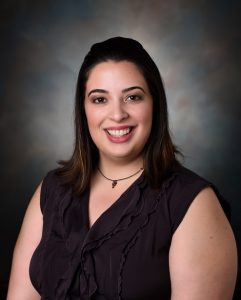MFRI takes pride in knowing Purdue students are able to learn about military and veteran families by working within all aspects of MFRI. As alumni, these students become one of our largest assets as they are the ones spreading the message about the importance of supporting military families.
Alumni Spotlight

NAME: Christina M. Marini, Ph.D.
HAILS FROM: Long Island, New York
MILITARY CONNECTIONS: Partner is a Lt. Col. in the Air Force (Active Duty)
MAJOR: Human Development and Family Sciences, Ph.D.
Work at MFRI
At MFRI, I gained a variety of work experiences on several research projects targeted towards improving the lives of military and veteran families. I spent most of my time working on the Family Journeys project, a study of Indiana National Guard families’ deployment-related experiences. I helped apply for grant funding; designed survey and interview instruments; recruited and retained participants; trained and supervised field interviewers; ensured data quality; and analyzed and presented data. In addition to my Family Journeys work, I traveled to U.S. military installations on both coasts to help evaluate military-sponsored programs. Together, these experiences enriched my professional and personal development as I learned, first hand, about the opportunities and challenges military and veteran families face.
Focus and impact on military and veteran research
Before I applied to graduate school, I worked as a program assistant for a mentoring program for children of incarcerated mothers. Through this work, I became interested in the cycles of separation and reunion that these families faced. I decided to pursue a graduate degree in Human Development and Family Sciences so I could study related stressors that cause families to be separated for extended periods of time, hoping to conduct research that would benefit families. Military deployments are vastly different from incarceration, but they leave families separated for long periods of time. I jumped at the opportunity to come to Purdue and study military families coping with deployment under the mentorship of my major professor, Dr. Shelley MacDermid Wadsworth. I have found military families to be a rewarding population to work with. Their commitment to each other and sense of unity will never cease to amaze me.
Over time, I became interested in how couples cope with external stressors — like deployments— and how such coping processes are related to their health and well-being. In my dissertation, I examined the ways non-deployed partners responded to service members’ concerns when communicating during deployment. I found that non-deployed partners who were more distressed prior to deployment were more likely to minimize service members’ concerns during deployment. This coping behavior resulted in negative implications for service members’ post-deployment mental health. This research filled an important, emerging need to better understand how couple communication during deployment maps onto both service members’ and their non-deployed partners’ mental health before—and after—deployment. This research was supported in part by a Bilsland Dissertation Fellowship awarded by Purdue’s College of Health and Human Sciences.
Findings from this work highlight the importance of promoting the “deployment readiness” of service members and their non-deploying partners. If non-deployed partners’ well-being is strengthened, they can be better support service members during deployment. These findings also highlight the importance of encouraging couples to prepare emotionally and logistically for an upcoming deployment. For instance, there may be value in equipping military couples with skills that help them to communicate about their plans for emotional and sensitive discussions during deployment. These findings may be incorporated into existing programming efforts from our partners at UCLA.
After MFRI
I’ve relocated to the Pennsylvania State University to begin an NIH-funded postdoctoral training program administered by the Center for Healthy Aging. I will continue to explore my interests in links between couple processes and health, now shifting my focus to consider couples coping with health stressors such as chronic illness in mid- and late-life. It is my hope to one day study veteran couples, perhaps long after stressors associated with deployment have ended, but as they cope with service-connected and normal developmental health stressors.
My experiences at MFRI afforded me the opportunity to gain an enriched professional skillset that continues to be an asset. MFRI is more than a place to work, it is a place to learn. The sense of community I gained from being a part of this organization was invaluable. I consider myself lucky to have crossed paths with an organization that is strongly committed to military and veteran families, and all of the undergraduate and graduate students who pass through its doors.
